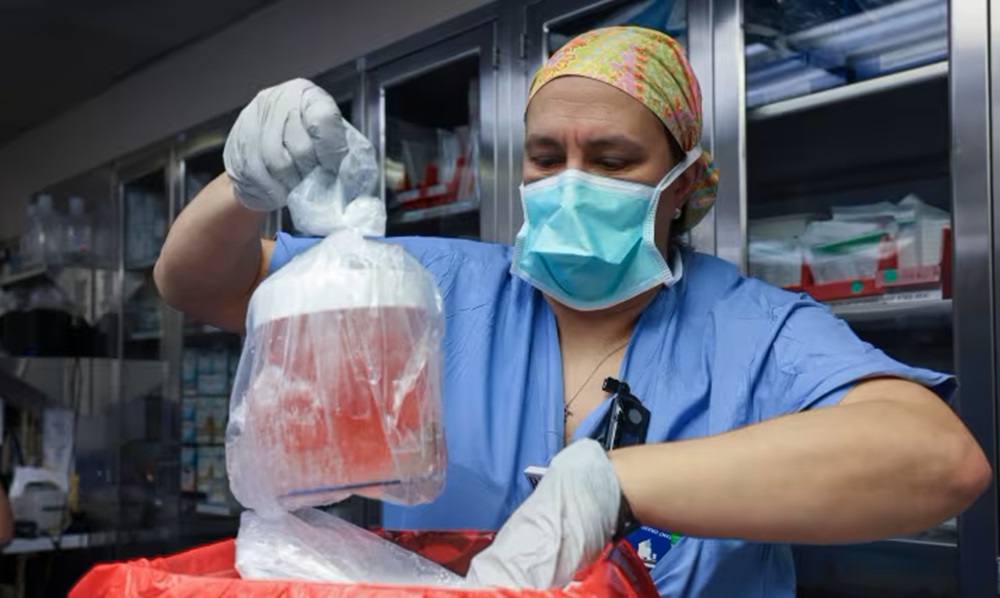Surgeons in Boston performed the first kidney transplant from a genetically modified pig into an ill 62-year-old man. If successful, the innovation will provide hope to hundreds of thousands of patients whose kidneys have failed.
So far, the results are encouraging. The new kidney began generating urine quickly after surgery last Saturday, and the patient’s condition is improving, according to doctors at Massachusetts General Hospital. He is already wandering the corridors of the hospital and may be released shortly.
The patient is a Black guy, and the treatment may be especially important for Black patients, who have a higher incidence of end-stage kidney disease.
A new source of kidneys “could solve an intractable problem in the field—the inadequate access of minority patients to kidney transplants,” said Dr. Winfred Williams, associate chief of the hospital’s nephrology division and the patient’s primary kidney doctor.
End to kidney dialysis
Dialysis “will become obsolete” if kidneys from genetically modified animals can be transplanted on a wide scale, according to Dr Leonardo Riella, medical director for kidney transplantation at Mass General. Mass General Brigham, the hospital’s parent organization, created the transplant program.
More than 800,000 Americans have renal failure and require dialysis, which removes toxins from the blood. More than 100,000 people are on the waiting list for a kidney transplant from a living or deceased human donor.
In addition, tens of millions of Americans suffer from chronic renal disease, which can cause organ failure.
While dialysis keeps individuals alive, organ transplants are the gold standard treatment. Thousands of patients die each year while waiting for a kidney due to a severe organ shortage. There are only 25,000 kidney transplants performed each year.
For decades, xenotransplantation, or the implantation of an animal’s organ into a person, has been advocated as a potential way to making kidneys more readily available. However, the human immune system rejects foreign tissue, resulting in potentially fatal consequences, and doctors warn that long-term rejection can occur even when donors are well matched.
In recent years, technological developments such as gene editing and cloning have brought xenotransplants closer to reality, allowing researchers to tweak animal DNA to make the organs more compatible and less likely to be rejected by the immune system.
Pigs Kidney Transplant
The kidney came from a pig produced by the biotech company eGenesis, which eliminated three genes that could cause transplant rejection. In addition, seven human genes were introduced to improve human compatibility. Pigs possess retroviruses that can infect humans, and the business also deactivated the diseases.
In September 2021, surgeons at NYU Langone Health in New York implanted a genetically engineered pig’s kidney to a brain-dead man and watched as it began to work and produce pee. Shortly after, experts at the University of Alabama at Birmingham stated that they had used a similar approach with comparable results.
Surgeons at the University of Maryland have twice transplanted genetically engineered pig hearts into patients with heart problems. While the organs worked and the first did not appear to be rejected, both patients, who had advanced disease, died soon after.
(Patients who consent to these cutting-edge experimental treatments are typically critically ill and have few options. Frequently, they are too sick to qualify for the waiting list for a valuable human organ or are ineligible for other reasons.
Richard Slayman, a state transport department supervisor, had diabetes and high blood pressure for many years and had been receiving treatment at Mass General for more than a decade.
First donated kidney failed
After his kidneys failed, Slayman underwent dialysis for seven years before getting a human kidney in 2018. However, the donated kidney failed within five years, and he suffered additional issues such as congestive heart failure, according to Williams.
When Slayman resumed dialysis in 2023, he developed serious vascular complications—his blood vessels were clotting and failing—and required frequent hospitalization, according to Williams.
Slayman, who continued to work despite his health issues, had a long wait for another human kidney, and “he was growing despondent,” Williams added. “He responded, ‘I just can’t continue like this. I can’t continue doing this. I began to consider exceptional steps we could use.
“He would have had to wait five or six years for a human kidney. He would not have been able to make it,” Williams continued.
When Williams inquired about receiving a pig’s kidney, Slayman had several questions but ultimately agreed to proceed.
“I saw it not only as a way to help me, but also as a way to provide hope for thousands of people who need a transplant to survive,” he said in a Mass General statement.
Slayman’s new kidney appears to be working thus far, and he has been able to discontinue dialysis. The new pig kidney produces pee as well as creatinine, which is a waste product.
His doctors noted that other measures are improving on a daily basis. Doctors will continue to watch Slayman for signs of organ rejection.
This article originally appeared in The New York Times









